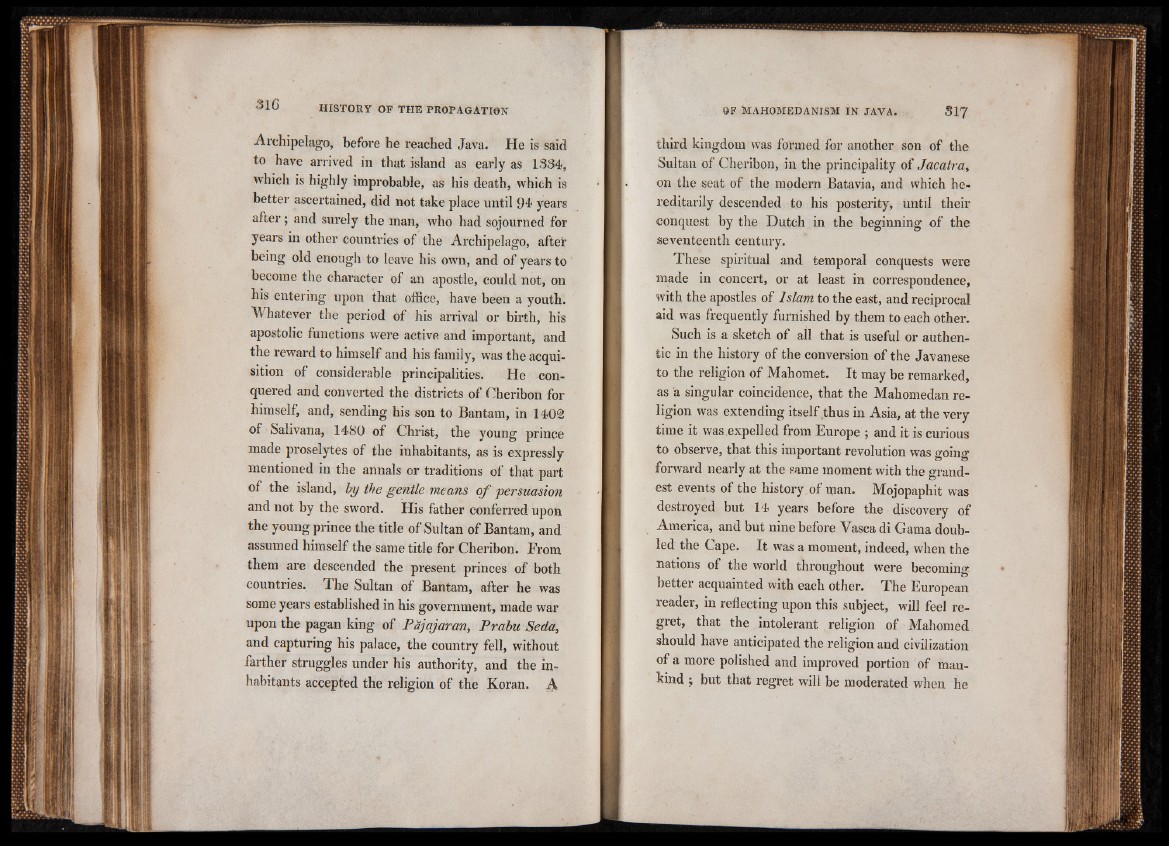
Archipelago, before he reached Java. He is said
to have arrived in that island as early as 1384,
which is highly improbable, as his death, which is
better ascertained, did not take place until 94 years
after; and surely the man, who had sojourned for
years in other countries of the Archipelago, after
being old enough to leave his own, and of years to
become the character of an apostle, could not, on
his entering upon that office, have been a youth.
Whatever the period of his arrival or birth, his
apostolic functions were active and important, and
the reward to himself and his family, was the acquisition
of considerable principalities. He conquered
and converted the districts of Cheribon for
himself, and, sending his son to Bantam, in 1402
of Salivana, 1480 of Christ, the young prince
made proselytes of the inhabitants, as is expressly
mentioned in the annals or traditions of that part
of the island, by the gentle means of persuasion
and not by the sword. His father conferred upon
the young prince the title of Sultan of Bantam, and
assumed himself the same title for Cheribon. From
them are descended the present princes of both
countries. The Sultan of Bantam, after he was
some years established in his government, made war
upon the pagan king of Pajajaran, Prabu Seda,
and capturing his palace, the country fell, without
farther struggles under his authority, and the inhabitants
accepted the religion of the Koran. A
third kingdom was formed for another son of the
Sultan of Cheribon, in the principality of Jacatra,
on the seat of the modern Batavia, and which hereditarily
descended to his posterity, until their
conquest by the Dutch in the beginning of the
seventeenth century.
These spiritual and temporal conquests were
made in concert, or at least in correspondence,
with the apostles of Islam to the east, and reciprocal
aid was frequently furnished by them to each other.
Such is a sketch of all that is useful or authentic
in the history of the conversion of the Javanese
to the religion of Mahomet. It may be remarked,
as a singular coincidence, that the Mahomedan religion
was extending itself thus in Asia, at the very
time it was .expelled from Europe ; and it is curious
to observe, that this important revolution was going
forward nearly at the same moment with the grandest
events of the history of man. Mojopaphit was
destroyed but 14 years before the discovery of
America, and but nine before Vasca di Gama doubled
the Cape. It was a moment, indeed, when the
nations of the world throughout were becoming
better acquainted with each other. The European
reader, in reflecting upon this subject, will feel regret,
that the intolerant religion of Mahomed
should have anticipated the religion and civilization
of a more polished and improved portion of mankind
; but that regret will be moderated when he